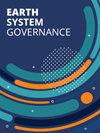Explaining emission reductions in cities: Configurations of socioeconomic and institutional factors
IF 4.4
Q1 ENVIRONMENTAL STUDIES
引用次数: 0
Abstract
Cities have taken center stage in the fight against climate change. Research identified key conditions shaping how cities tackle climate change but hasn't yet addressed how such conditions interact in order to reduce emissions. The present paper contributes to filling this gap through a crisp-set Qualitative Comparative Analysis of 34 CDP-reporting cities, identifying combinations of institutional and socioeconomic factors that are systematically associated with emission reductions. Results show emission reductions both in presence and in absence of favorable socioeconomic conditions. Under favorable socioeconomic conditions, institutions seem central to the task of steering the capacities of the local business community and reaping scale benefits. Under unfavorable socioeconomic conditions, institutions seemingly play a key role in gathering resources, reaching out to broader networks on the international stage. Implications for policy and research are explored.
求助全文
约1分钟内获得全文
求助全文

 求助内容:
求助内容: 应助结果提醒方式:
应助结果提醒方式:


